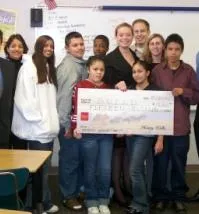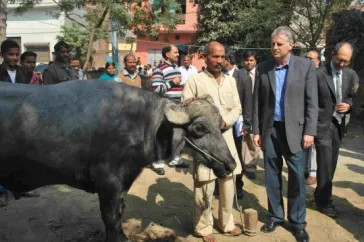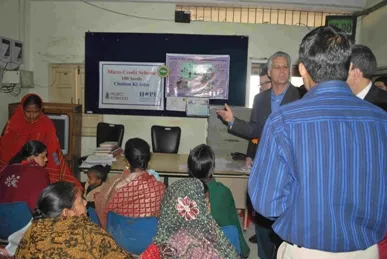April 08, 2010
In Delhi, India, the Hope Foundation has recently been able to immunize thousands of children and treat an additional 100,000 patients. Closer to home, BUILD, a four-year college preparation program working with underserved youth in California and Washington, DC, has been able to scale up its local programs to the regional level.

What has enabled such expansions? Strategically applied funds from Project Redwood, a new venture philanthropy fund of the Stanford GSB Class of 1980. The only nonprofit that receives all of its financial support and volunteer efforts from a single business school class, Project Redwood has distributed $400,000 over the past 3 years to organizations that use entrepreneurial approaches to fight poverty. This summer, it will award another $150,000 to worthy efforts.
“We support projects that are easily replicated and can help people grab onto a rung of the economic ladder and begin pulling themselves up,” says Edward Kaufman, former Project Redwood co-chair.
In addition to Hope and BUILD, Nuru International, DIG, and Village Enterprise Fund have also received funding and support for specific projects. Nuru, created by a Stanford business school alum, works to empower rural African communities to achieve self-sufficiency in the key areas of agriculture, water, healthcare, education, and community development. Uganda’s Village Enterprise Fund endeavors to break the cycle of poverty in East Africa through training, seed capital, and mentoring for income-generating small businesses. DIG, located in Cambodia, Kenya, and South Africa, helps to improve the physical, emotional, and economic wellbeing of impoverished individuals with HIV/AIDS by installing micro-nutrient rich gardens using local, low-, and no-cost materials.

“Every project we’ve funded has met its original goals,” notes Kaufman. “We’ve been pleased enough to support some of them several years running.”
In 2009, Project Redwood also sponsored five teams of students from Stanford’s Institute of Design in the creation of affordable products aimed at solving some of the problems of extreme poverty and treating the poor as customers, not charity recipients. Among their efforts is a water fortification device for rural Rwanda, a solar-powered battery charger, and a mixer that distributes nutrition into milled flour.
Members of the Class of 1980 have provided intellectual resources to their poverty-busting fundees, as well. “They’ve gone the extra mile in offering us extremely valuable advice and introductions that have expanded our networks and influenced our thinking,” says Mark Templer, director of HOPE South Asia. “It’s an impressive and committed group of supporters.” adds Suzanne McKechnie Klahr (Stanford Law; JD’99), founder and CEO of BUILD.
The original idea of pooling resources to support a social cause was the brainchild of Carol Head, who was inspired by a panel on giving back held at her 25th Reunion. “I recognized that our class had wealth and skills that we could bring forward to help solve some of the world’s most desperate problems,” she says. After months of debate among a large group of classmates, the class settled on creating a venture philanthropy fund to address extreme poverty worldwide. With others, Head rallied together a core group of 12 or so classmates, including Ed Kaufman, Kristi Smith-Hernandez, Donna Allen, Jed Daly, Mike Watt, Patty Mintz, and Phil Jonckheer.

“We then engaged our other classmate friends to join us,” says Head. So far, more than 120 members (an impressive 40 percent of the class) have made contributions and/or given their time and expertise. Current co-chairs are Beth Gibson Sawi and Kristi Smith-Hernandez.
All nominations for projects must come from a Project Redwood classmate. Applying a rigorous evaluation screen, Project Redwood partners vote for the most worthy projects, aided by professionals at Rockefeller Philanthropy Advisors. The top five receive funding and consulting assistance.
“Our class likes to address complex challenges, and the problem of poverty is both complex and meaningful,” says Carol Head. “Thinking about what we can accomplish together with Project Redwood, we all have the sense that we’ve only just begun. There’s much more that this committed group plans to do to address the devastation of extreme poverty.”
–Marguerite Rigoglioso
For media inquiries, visit the Newsroom.



